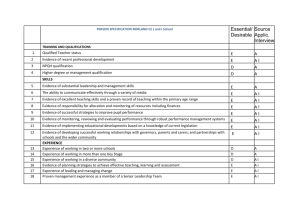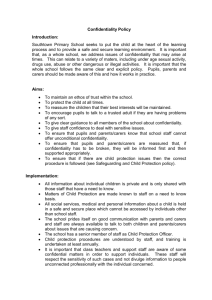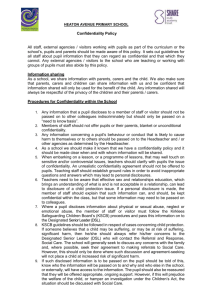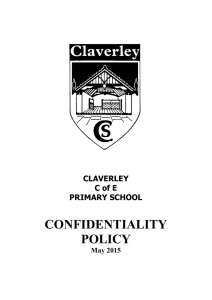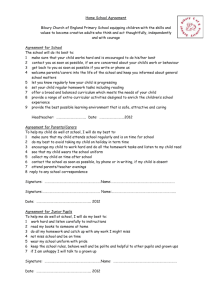Model Confidentiality Policy for Schools
advertisement
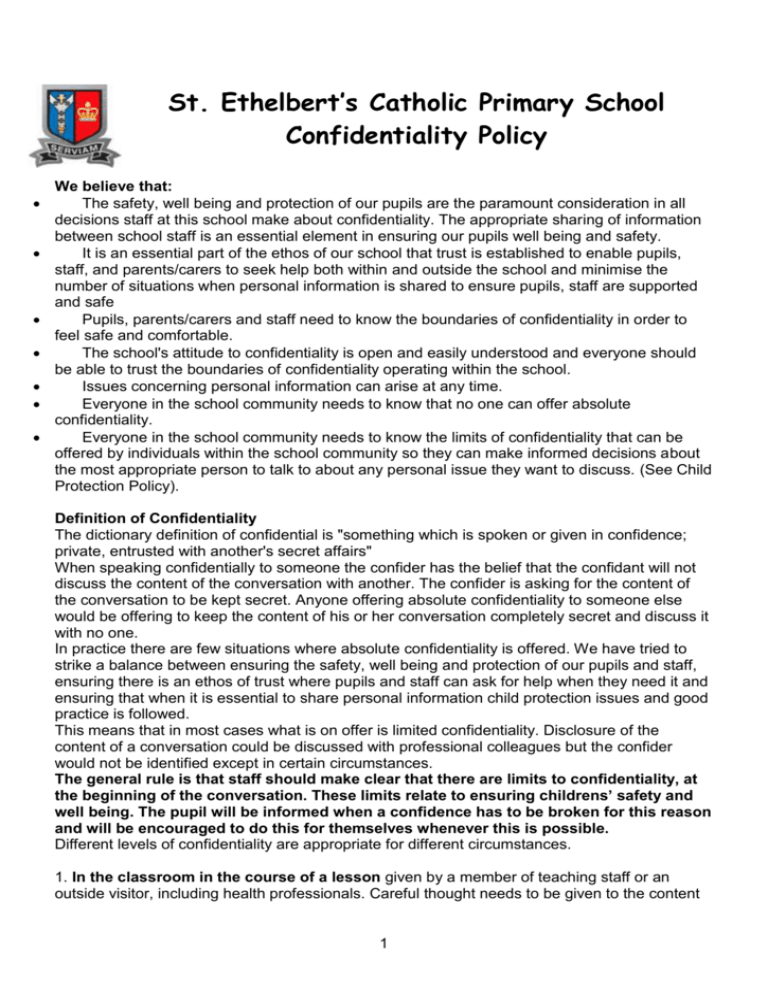
St. Ethelbert’s Catholic Primary School Confidentiality Policy We believe that: The safety, well being and protection of our pupils are the paramount consideration in all decisions staff at this school make about confidentiality. The appropriate sharing of information between school staff is an essential element in ensuring our pupils well being and safety. It is an essential part of the ethos of our school that trust is established to enable pupils, staff, and parents/carers to seek help both within and outside the school and minimise the number of situations when personal information is shared to ensure pupils, staff are supported and safe Pupils, parents/carers and staff need to know the boundaries of confidentiality in order to feel safe and comfortable. The school's attitude to confidentiality is open and easily understood and everyone should be able to trust the boundaries of confidentiality operating within the school. Issues concerning personal information can arise at any time. Everyone in the school community needs to know that no one can offer absolute confidentiality. Everyone in the school community needs to know the limits of confidentiality that can be offered by individuals within the school community so they can make informed decisions about the most appropriate person to talk to about any personal issue they want to discuss. (See Child Protection Policy). Definition of Confidentiality The dictionary definition of confidential is "something which is spoken or given in confidence; private, entrusted with another's secret affairs" When speaking confidentially to someone the confider has the belief that the confidant will not discuss the content of the conversation with another. The confider is asking for the content of the conversation to be kept secret. Anyone offering absolute confidentiality to someone else would be offering to keep the content of his or her conversation completely secret and discuss it with no one. In practice there are few situations where absolute confidentiality is offered. We have tried to strike a balance between ensuring the safety, well being and protection of our pupils and staff, ensuring there is an ethos of trust where pupils and staff can ask for help when they need it and ensuring that when it is essential to share personal information child protection issues and good practice is followed. This means that in most cases what is on offer is limited confidentiality. Disclosure of the content of a conversation could be discussed with professional colleagues but the confider would not be identified except in certain circumstances. The general rule is that staff should make clear that there are limits to confidentiality, at the beginning of the conversation. These limits relate to ensuring childrens’ safety and well being. The pupil will be informed when a confidence has to be broken for this reason and will be encouraged to do this for themselves whenever this is possible. Different levels of confidentiality are appropriate for different circumstances. 1. In the classroom in the course of a lesson given by a member of teaching staff or an outside visitor, including health professionals. Careful thought needs to be given to the content 1 of the lesson, setting the climate and establishing groundrules to ensure confidential disclosures are not made. It should be made clear to pupils that this is not the time or place to disclose confidential, personal information. When a health professional is contributing to a school health education programme in a classroom setting, s/he is working with the same boundaries of confidentiality as a teacher. 2. One to one disclosures to members of school staff (including voluntary staff). It is essential all members of staff know the limits of the confidentiality they can offer to both pupils and parents/carers and any required actions and sources of further support or help available both for the pupil or parent/carer and for the staff member within the school and from other agencies, where appropriate. All staff at this school encourage pupils to discuss difficult issues with their parents or carers, and vice versa. However, the needs of the pupil are paramount and school staff will not automatically share information about the pupil with his/her parents/carers unless it is considered to be in the child’s best interests. 3. Disclosures to a counsellor, school nurse or health professional operating a confidential service in the school. Health professionals such as school nurses can give confidential medical advice to pupils provided they are competent to do so and follow the Fraser Guidelines. School nurses are skilled in discussing issues and possible actions with young people and always have in mind the need to encourage pupils to discuss issues with their parents or carers. However, the needs of the pupil are paramount and the school nurse will not insist that a pupil's parents or carers are informed about any advice or treatment they give. The legal position for school staff: School staff (including non-teaching and voluntary staff) should not promise confidentiality. Pupils do not have the right to expect that incidents will not be reported to his/her parents/carers and may not, in the absence of an explicit promise, assume that information conveyed outside that context is private. No member of this school's staff can or should give such a promise. The safety, well being and protection of the child is the paramount consideration in all decisions staff at this school make about confidentiality. School staff are NOT obliged to break confidentiality except where child protection is or may be an issue. Staff: All staff at this school receive basic training in child protection as part of their induction to this school and are expected to follow the schools' child protection policy and procedures. Visitors and non-teaching staff: We expect all non teaching staff, including voluntary staff to report any disclosures by pupils or parents/carers, of a concerning personal nature to the designated child protection co-ordinator as soon as possible after the disclosure and in an appropriate setting, so others cannot overhear. This is to ensure the safety, protection and well being of all our pupils and staff. The designated child protection co-ordinator will decide what, if any, further action needs to be taken, both to ensure the pupil gets the help and support they need and that the member of staff also gets the support and supervision they need. Parents/carers: It is essential to work in partnership with parents and carers and we endeavour to keep parents/carers abreast of their child's progress at school, including any concerns about their progress or behaviour. However, we also need to maintain a balance so that our pupils can share any concerns and ask for help when they need it. Where a pupil does discuss a difficult personal matter staff, they will be encouraged to also discuss the matter with their parent or 2 carer themselves. The safety, well being and protection of our pupils is the paramount consideration in all decisions staff at this school make about confidentiality. Complex cases: Where there are areas of doubt about the sharing of information, seek a consultation with your local KCC Children’s Safeguards Service Child Protection Co-ordinator. Statement of ground rules to be used in lessons We adopt groundrules to ensure a safe environment for teaching in particular in PSHE and Circle time. This reduces anxiety to pupils and staff and minimises unconsidered, unintended personal disclosures. At the beginning of each PSHE lesson and Circle time, pupils are reminded of the groundrules by the teacher or outside visitor. The teacher establishes the ground rules together with the pupils at the beginning of each half term of teaching PSHE and Circle time. When confidentiality should be broken and procedures for doing this: See the Child Protection Policy If the Headteacher issues instructions that s/he should be kept informed, all staff must comply. There is always a good reason for this, which you may not know about. The principles we follow: Ensure the time and place are appropriate, when they are not we reassure the child that we understand they need to discuss something very important and that it warrants time, space and privacy. See the child normally (and always in cases of neglect, or abuse) before the end of the school day. More serious concerns must be reported immediately to ensure that any intervention necessary to protect the child is accessed as early as possible. Tell the child we cannot guarantee confidentiality if we think they will: hurt themselves hurt someone else or they tell us that someone is hurting them or others Not interrogate the child or ask leading questions We won't put children in the position of having to repeat distressing matters to several people Inform the pupil first before any confidential information is shared, with the reasons for this Encourage the pupil, whenever possible to confide in his/her own parents/carers Support for staff Staff may have support needs themselves in dealing with some of the personal issues of our pupils. We prefer you to ask for help rather than possibly making a poor decision because you don't have all the facts or the necessary training, or taking worries about pupils home with you. Review: This policy is reviewed every 2 years or whenever deemed necessary by the Headteacher and Governors in the light of events and changes in the law. Headteacher Review October 2016 3

